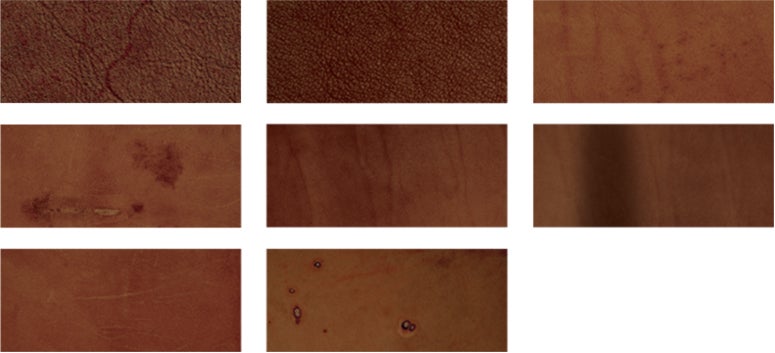Fabric and Leather Care
Care & Cleaning of Upholstery
To prevent soiling in general, frequent vacuuming or light brushing with a nonmetallic, stiff bristle brush to remove dust and grime is recommended. Use a professional furniture cleaning service when an overall soiled condition has been reached.
To successfully clean fabric, it is important to determine the type of fabric and the recommended cleaning code. This information can be found on the tag attached to the furniture.
Code W Cleaning Instructions
Spot clean only with water-based shampoo or foam upholstery cleaner. Pretest a small, inconspicuous area first. Do not saturate. Clean spots or stains from the outside to the middle of the affected area to prevent circling. When cleaning a spill, blot immediately to remove spilled material. Pile fabrics may require brushing with a nonmetallic, stiff bristle brush to restore appearance.
Do not use solvents to spot clean. Hot water extraction or steam cleaning is not recommended. Cushion covers should not be removed and laundered.
Code S Cleaning Instructions
Spot clean only with a water-free dry cleaning solvent. Pretest a small, inconspicuous area first. Do not saturate. Clean spots or stains from the outside to the middle of the affected area to prevent circling. When cleaning a spill, blot immediately to remove spilled material. Pile fabrics may require brushing with a nonmetallic, stiff bristle brush to restore appearance.
Do not use water. Cushion covers should not be removed and dry cleaned.
Code W-S Cleaning Instructions
Water-Based Stains
Water-based stains include ketchup, mustard, wine, soft drinks and most food stains.
- Lightly blot the area to remove excess liquid compounds. This may be done with a paper towel or a light cotton terrycloth.
- Using neutral soap and water, gently rub the soiled area from side to center to avoid a halo effect.
- Rinse thoroughly with plain water to remove excess soap.
- The area may then be blotted with a clean towel, rubbing in a gentle circular motion to maintain the suede surface or dried by using a hair dryer to quickly complete the drying process.
- Buff or vacuum afterwards to maintain the suede look and feel.
Oil-Based Stains
Oil-based stains include ink stains, cake-type shoe polish and cosmetics.
- In most cases, these stains may be cleaned with a mild soap and water solution, as with water-based stains, if the area is only lightly soiled. Examples of this would be a light pen mark or light shoe polish on the bottom of a recliner.
- For heavier stains, a solvent compound may be necessary. If so, any over-the-counter compound, such as K2r upholstery cleaner or other nonbleaching household cleaners, may be used. Always spot clean an inconspicuous area first with the cleaner to make sure the fabric will not be damaged. Always follow instructions on the label of the cleaner. Lightly clean the area with neutral soap and water to remove any excess cleaner.
- Dry and buff as in steps 4 and 5 for water-based stains.
Code X Cleaning Instructions
Do not use a foam or liquid cleaner of any type. Vacuum or brush lightly to remove soil.
Care & Cleaning of Leather
Leather Care Basics
Leather is a natural material which, when properly cared for, will maintain its beauty and appearance for many years. It is also the easiest to care for of all upholstery materials. Each leather type has its own care and cleaning specifications, but there are also some generalizations.
- Keep it clean - Dust and vacuum often, using a crevice tool in seams.
- For weekly dusting use a clean, soft lint-free cloth slightly dampened with distilled water and wipe gently.
- Avoid direct exposure to sunlight. Although leather is resistant to fading, prolonged direct exposure to the sun will cause any material to fade.
- Keep leather furniture at least 12" away from radiators and other heat sources. Avoiding intense heat will help prevent the leather from drying and possibly cracking.
- Clean spills quickly. Just as with any upholstery, leather can become stained if spills are not cleaned up immediately. If spills do occur, attend to them quickly remembering to blot, not rub, the stain.
- Use a solution of 1/2 mild soap, such as Neutrogena or Ivory, and 1/2 distilled water on a slightly dampened cloth or sponge, working up a foam to clean.
- Avoid excessive rubbing with a cloth. Blot any remaining soap residue with a clean cloth dampened only with clear distilled water. Blot until dry, repeating as necessary.
- Contact a professional leather cleaning service for more difficult stains.
Full Aniline Leather
Handcrafted premium leathers are treated with Aniline dye to preserve the natural, rustic beauty that makes each upholstered piece unique. This enhanced Crypton finish provides an invisible, protective shield that prolongs the life of the leather.
- Protects against harmful UV damage
- Repels dust, dirt and stains
- Replenishes natural oils
- Environmentally safe*
Aniline dye enhances natural markings such as wrinkles, scars and brands in each hide. These dramatic color variations are hallmarks of quality and give each piece a distinctive look all its own. The following images show some of the types of surface variations that could be visible.

*Crypton Leather Enhance uses bio-renewable materials produced from sand or mined silicon metal, and it is not petroleum-based. We only use chemistry that is safe for humans and the environment.
If you have further questions relating to your particular piece of furniture, please contact your dealer. If you have a special question, please contact Customer Service and we’ll get back to you promptly.
